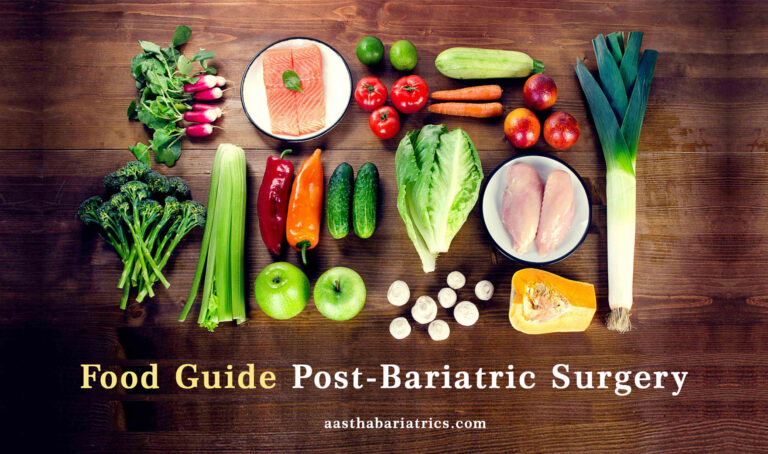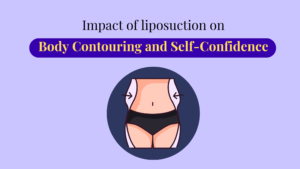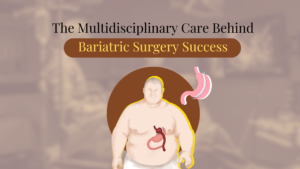Food Guide Post-Bariatric Surgery - Aastha Bariatrics

When a knee replacement is needed?
Should I give up on my favourite foods?
So many queries arise once you choose bariatric surgery.
The answer is Yes!
You not only come back to your regular diet but can enjoy all your favorite foods.
Your healthcare provider will teach you about foods you can eat and foods you should avoid. It is very important to follow these diet guidelines.
Along with this, We also have a common question mostly asked,
So many queries arise once you choose bariatric surgery.
Should I cut down on my daily consumption of food?
There are several diet steps to follow after weight loss surgery. Different steps include different foods of different textures. This is a very important step for your stomach healing process. The phases of including different food textures depend on the stomach healing process, the duration for which is usually 2 to 3 weeks for around two months until you are back on your regular diet. This phase includes 5 steps:
Step 1: Clear Liquid Diet: You will begin consuming a clear liquid diet while you are still in the hospital — within the first 24 hours after surgery, only water will be provided. The primary goal of this diet is to keep you hydrated while also avoiding any possible irritants to your stomach. This diet has to be continued for 14 days post-surgery. Clear liquids allowed on this diet include broths, water, clear soups, coconut water, juices, etc.
Step 2: Residual Liquid Diet: You will move on to a full liquid diet after 2 weeks of your surgery. Consuming enough protein is very important after weight loss surgery. Protein helps you build and maintain muscle mass and also supplies your body with energy. This diet phase includes protein shakes, milk, buttermilk, vegetable soups, chicken soups, etc. that you will be drinking throughout about 14-28 days(2-3 weeks)
Step 3: Pureed Diet: After the full liquid diet, the introduction of solid foods with a pureed texture will begin . Think baby food, the same texture food we provide to infants. This lets you slowly rebuild your tolerance of solid foods. You will eat a soft diet between weeks three and four after surgery. During this phase, you’ll continue to prioritize protein, however, you will be able to get the nutrients from foods including scrambled eggs, hummus, Minc chicken, blended khichdi, etc. You will still consume protein shakes, but they will be used to supplement your intake of food, instead of providing all of your protein. Four to six weeks after surgery, you will continue to consume protein at each meal, but you will be able to challenge yourself by slowly incorporating tougher food textures. These dense foods include soft fruits and vegetables, as well as some grains.
Step 4: Soft Diet: Six to Seven weeks after surgery, you will continue to consume protein at each meal, however, by now you will be able to challenge yourself by slowly incorporating tougher food textures. These dense foods include soft fruits and vegetables, as well as some grains.
Step 5: Full Diet: About Eight weeks after your procedure, you will now be able to begin your regular full diet. An important aspect of this phase is to be mindful of your “new fullness,” as satiety might come earlier than you expect. You will still prioritize protein at each of your three daily meals, and can also incorporate raw and fibrous fruits and vegetables.
A new way of Eating
Remember to eat slowly and chew each bite very slowly and completely. Do not swallow food until it is smooth. Take at least 20 to 30 minutes to eat a meal.
Eat 6 small meals throughout the day instead of 3 big meals. Do not snack between meals.
Stop eating as soon as you are full.
You will need to drink up to 8-10 cups (2-3 lts) of water or other calorie-free liquids every day. Follow these guidelines for drinking:
Avoid Drinking water for 30 minutes before and after you eat food. Also, do not drink anything while you are eating. The liquid will fill you up. This may keep you from eating enough healthy food..
Take small sips when you are drinking. Do not gulp.
There are some foods and drinks that are likely to cause adverse reactions and should be avoided throughout the entire post-op period like carbonated beverages, sugar-sweetened beverages, gum, and severely spicy foods often not well tolerated.
You also should limit caffeine because it can irritate your stomach.
Adding multivitamins as per guidance also becomes a compulsory procedure post-surgery.
Remember your calories still count.
Exercise along with massages is mandatory throughout the post-op period for body toning.
Take Care and so do We!!
Read also; The Cost of Bariatric Surgery in India
Why We Are?
- Asia's Trusted Bariatric Center
- Centre of Excellence
- Patient Trusted Highly Volume Bariatric Center in Mumbai
- EMI, Cashless & Mediclaim Facilities are Available
- Daily Patients Follow-up after Bariatric Surgery
- Patient Support Group Every Month
- Obesity Awareness Program
- Available with Latest Technologies
- 18+ Experience in Weight Loss Bariatric Surgery
- 300+ Weight Loss Diet Plan & Recipes
- Highly Trained & Experienced Bariatric Nutritionist
- Patient WhatsApp Chat Group
- & Many More
Medically reviewed by Dr. Manish Motwani, Bariatric & Metabolic Laparoscopic Bariatric Surgeon — Curated by Sweta Jain







